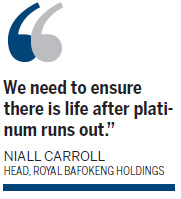Society
Platinum brings riches to tribe
Updated: 2011-02-14 07:47
By Alexandra Lesieur (China Daily)
|
|
PHOKENG, South Africa - South Africa's Bafokeng people live on the biggest platinum deposits in the world, a resource that has transformed the once-traditional tribe into a mini-state with its own investment company.
The Royal Bafokeng Nation - a kingdom of some 300,000 people about 120 kilometers northwest of Johannesburg - has its own professionally designed web site, a majority stake in a listed platinum firm and a two-percent share in telecoms giant Vodacom.
The kingdom's capital, Phokeng, is also home to the newly renovated Royal Bafokeng Stadium, which hosted six matches in the 2010 World Cup.
The 29 villages of the tribe's homeland all have clinics, schools, new roads and running water, a stark contrast with the poverty of much of rural South Africa.
"They are the richest tribe in Africa because African tribes were destroyed and marginalized by colonialism," says the University of Pretoria's Martin Selepe, whose doctoral thesis is on traditional leadership in modern South Africa.
In the 19th century, as colonial settlers moved progressively farther inland, the Bafokeng pooled their money to buy their ancestral land and keep it out of white farmers' hands.
King August Mokgatle sent Bafokeng workers to the booming mine town of Kimberley, where they took jobs in the diamond fields and sent money home to help purchase land.
Blacks were not then allowed to buy land, so German missionaries fronted the deals.
Then, in 1924, a geologist discovered the Bushveld Igneous Complex, a massive deposit of platinum group metals, under the Bafokeng's feet.
After fighting decades of legal battles with the government and mining companies, the Bafokeng finally won the mineral rights to the land. Their valley holds half the platinum in South Africa, which itself has 87 percent of the world's reserves.
Today, the Bafokeng earn between 700 and 800 million rand ($103 million-$117 million) a year in dividends and royalties.
The tribe owns a 57 percent stake in Royal Bafokeng Platinum, which listed on the Johannesburg stock exchange last year, and a 13 percent stake in mining firm Implats.
The kingdom, which is today ruled by King Leruo Molotlegi, spends part of the revenues on community development projects, including scholarships, small business grants and free school lunches for children.
The rest it reinvests.
"We need to ensure there is life after platinum runs out," Niall Carroll, the head of Royal Bafokeng Holdings, the tribe's investment company, told the magazine Financial Mail.
Geologists say the platinum reserves could be exhausted in 50 years.
The Bafokeng's surroundings are a daily reminder of what life would be like without it.
In the village of Photsaneng, the brick houses of the Bafokeng stand next to the sheet-metal shanties of mine workers from outside.
"I don't see what is good" about life here, says 37-year-old Thulane Mahlalela, who arrived four years ago looking for mine work but has yet to find a job.
"There's no water here, no electricity," he says.
Mahlalela stays in a shantytown two steps from an Anglo Platinum mine. The Bafokeng have done nothing to develop the area for fear of attracting more migrants.
"Everybody is coming here for work," says Lucain Paulik, head of infrastructure for the Bafokeng Nation.
"We don't want to encourage it. There is no school, no clinic in informal settlements," he adds.
"Migrant workers put a lot of stress on the infrastructure."
These outsiders bring with them the problems of the rest of South Africa, where 43 percent of people live in poverty: crime, unemployment, alcoholism and HIV.
Older tribe members still remember lives of similar poverty before the platinum boom.
Joseph Rapetsana, 56, one of the Bafokeng's 75 traditional chiefs, recalls what the kingdom was like before the tribe started pouring platinum money into development projects.
"Before the revenue was put into development, it was difficult for us to go to school, to go to the hospital, because there was no road, no shops in the villages. Life was very difficult," he says.
That all changed with the boom.
"Now, you can put Phokeng on the world map," he says.
Agence France-Presse
E-paper

Ear We Go
China and the world set to embrace the merciful, peaceful year of rabbit
Preview of the coming issue
Carrefour finds the going tough in China
Maid to Order
Specials

Mysteries written in blood
Historical records and Caucasian features of locals suggest link with Roman Empire.

Winning Charm
Coastal Yantai banks on little things that matter to grow

New rules to hit property market
The State Council launched a new round of measures to rein in property prices.

